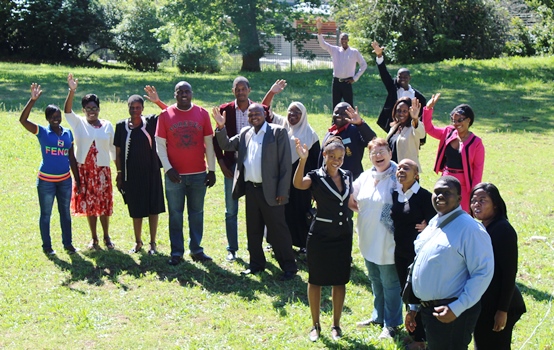Advocacy training inspires Eco-action.
- Published:
15 faith leaders from Zimbabwe, South Africa, Malawi and Kenya attended SAFCEI’s first Faith Leaders’ Environment Advocacy Training (FLEAT) in November. The programme was run in Cape Town over three days by Liziwe McDaid, SAFCEI’s Energy and Climate Change Programme Coordinator. The participants selected for training in advocacy skills were specifically chosen for their passion and awareness about environmental issues. They expressed huge appreciation for the opportunity to be able to connect and discuss concerns with equally enthusiastic people from other countries.
 SAFCEI believes that people of faith have a moral imperative to speak against the socio-ecological injustices that face Africa’s peoples and natural environment. This vision inspired FLEAT which aims to empower and support faith leaders in Africa to witness for the earth, to share their local experiences and to act against injustice. This involves:
SAFCEI believes that people of faith have a moral imperative to speak against the socio-ecological injustices that face Africa’s peoples and natural environment. This vision inspired FLEAT which aims to empower and support faith leaders in Africa to witness for the earth, to share their local experiences and to act against injustice. This involves:
- Supporting local actions at faith community level that demonstrate a way of living that restores rather than destroys nature and human community.
- Sharing stories of hope that inspire action.
- Challenging governments by reminding them to act from principles and values that protect the earth’s living systems, as well as encouraging governments to overcome their fear of change so that they support environmentally sustainable policies.
The course gave an overview of critical issues such as water and food security, land, biodiversity, transport, energy and the impacts of climate change. Participants were able to relate local examples to many of these issues. They were asked to identify a key issue in their community which they have the ability to address. Their ideas were wide ranging and included: creating and playing CDs with environmental messages set to music in taxis, placing recycling centres at bus and taxi ranks, starting a youth centre for environmental awareness, establishing tree nurseries and community woodlots, etc.
Appropriate actions and solutions were brainstormed, drawing on the knowledge and experience of the group. The participants are now expected to initiate their action plans in their faith communities within the following 6 months. Two additional training meetings are scheduled at 6 month intervals to support the participants with the implementation of their projects. It is anticipated that during these training meetings, the participants will also become trainers as they share their experiences and evolving strategies. The aim is that they will not only implement a successful environmental project, but also develop the skills to become eco-justice advocates within their communities.
Feedback from the participants was very positive.
“It gave me the know-how and power to make a change.”
“It was eye opening. The practical on alternative sources of energy gives us the knowledge to ease the deforestation.”
“To me everything was just excellent.”
“I am now in a position to cook using solar energy.”
More good news! There was so much interest shown in the FLEAT that SAFCEI will be running a parallel programme in 2015 to engage with and train more potential advocates to work for a restored and resilient Africa.
Kim Kruyshaar for SAFCEI, December 2014
Who we are

SAFCEI (Southern African Faith Communities’ Environment Institute) is a multi-faith organisation committed to supporting faith leaders and their communities in Southern Africa to increase awareness, understanding and action on eco-justice, sustainable living and climate change.
Featured Articles
-

South Africa: Who Ends Up Paying If DMRE Cooks the Price of Nuclear Power?
-

South Africa’s nuclear energy expansion plans continue to draw criticism, environmental NGOs chew over legal challenge
-

Earthlife Africa and SAFCEI respond to latest unsettling nuclear news regarding the ministerial determination
-

Open Wing Alliance Africa (Virtual) Summit 2023
-

The Green Connection and SAFCEI respond to energy minister's divisive and deflecting comments
-

Job Vacancy: FLEAT Coordinator







